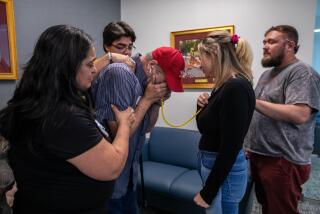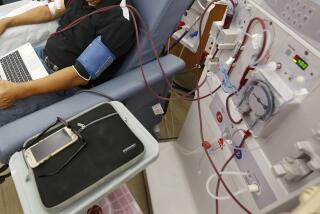Transplantable organs lost to delays, outdated practices [Updated]
- Share via
With more than 110,000 people awaiting the gift of an organ in the United States, health professionals know they can ill afford to squander the chance that a grieving family will say “yes” to organ donation. And yet, in this season of gift-giving, two new studies find that the gift of life is all too often lost to delay and imperfect hospital practices.
With the exception of some kidney and liver transplants, organs and tissues used in transplantation come from the bodies of those who have been declared brain-dead, usually as a result of trauma, stroke or a sudden blockage of bloodflow to the brain. In the interest of ensuring that such patients are not hastily declared hopeless cases, most states have adopted a policy that requires two separate medical examinations--separated by at least six hours--before organ donation is considered. To proceed, a qualified physician must conclude after each exam that the patient’s brain has sustained irreparable damage inconsistent with life.
A study published Wednesday in the journal Neurology finds that such a policy, while well intended, is unnecessary, allows organs to go to waste and leaves families of a prospective organ donor in agonizing limbo, often causing them to decline organ donation or withdraw initial support for such a gift.
To study the impact of those practices, physicians and researchers in New York, at the Mayo Clinic in Minnesota and at Dalhousie University in Canada tracked all cases of patients declared brain dead in 100 New York hospitals during a 30-month period between 2007 and 2009. [Updated Dec. 15, 3:55 p.m. An earlier version of this article said researchers tracked all cases of patients declared brain dead in New York.] Of the 1,229 adult cases and 82 pediatric cases during that period, they found that busy hospital staff stretched the time between the exams to a median of 18.5 hours, well past the six-hour span originally foreseen.
In that time, 12% of the patients suffered a cardiac arrest, making their organs unuseable for transplant. The rate at which families of the victims consented to organ donation decreased from 57% to 45% as the time between the two exams expanded, and the rate at which families refused to donate their loved one’s organs went from 23% to 36% as the gap between exams grew.
Moreover, delays in conducting even the first exam--especially lengthy on weekends, when hospitals are less well staffed--caused even more organs to be lost, the researchers found. In all, 656 of the patients tracked were referred as potential organ donors, but suffered cardiac arrest before even one exam was initiated.
The loss of those organs was costly in every way: long delays between the two exams cost the 100-hospital New York region where the study was conducted an average of $1 million annually in intensive-care-unit costs while prospective donors awaited their second exam--an expense the authors caused “profligate.” Most importantly, long delays between the two exams in no way benefited patients or their families, the researchers found. Not one of the patients who had been declared brain-dead in a first examination had a return to brain stem function, or was able to breathe unaided by the time the second was conducted, the researchers found.
A second study tallied the cost of a widely used procedure to maintain the flow of oxygenated blood in prospective organ donors’, and proposed an alternative procedure for doing so that better preserved the lungs of a brain-dead patient for potential donation.
Published in the Journal of the American Medical Assn., the study found that by leaving lungs slightly inflated between “breaths” and lowering the volume of air flowing into the lungs from a respirator, physicians were able to double the proportion of lungs that were healthy enough for transplantation. The alternative respirator strategy also cut the intensive-care unit stays of lung recipients by a third and slightly improved the survival of patients who got those lungs.







